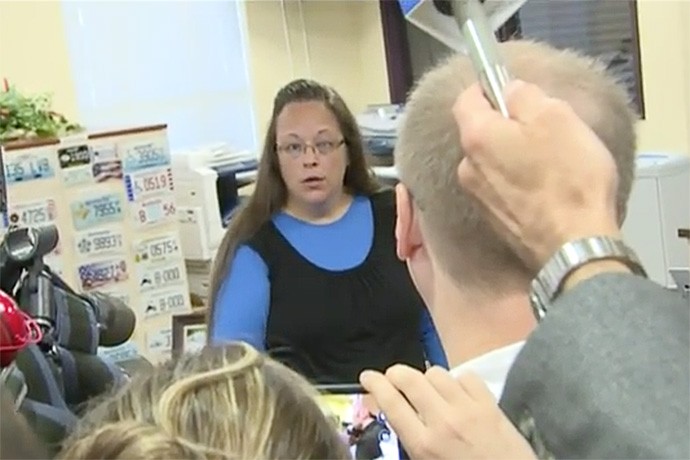UPDATE: Following this morning’s hearing, Kim Davis has been taken into custody by U.S. Marshals for contempt of court.
Republican presidential candidate Mike Huckabee, not known for shying away from hot-button religious culture war battles, “visited by phone” with Rowan County, Kentucky court clerk Kim Davis yesterday, according to a statement issued by his campaign. “I let her know how proud I am of her for not abandoning her religious convictions and standing strong for religious liberty,” the former pastor, Arkansas governor, and now two-time presidential candidate said in a statement. Arguing that “the Supreme Court cannot and did not make a law,” but only a “ruling on a law,” Huckabee maintained that “Kim does not have the Constitutional authority to issue a marriage license to homosexual couples.”
Davis will be in federal court later this morning, for a hearing on whether she should be held in contempt of court. Translation: federal courts do indeed have the authority to decide whether Davis is obligated to issue those marriage licenses.
Huckabee’s mixed-up civics lesson, though, is a bit of a red herring. He portrays Davis as standing up for her religious liberty in the face of a court that in his view, lacks the authority to compel her to act. Because Davis is, in her own words, acting under “God’s authority,” the Supreme Court should be relegated, in Huckabee’s view, to an impotent, irrelevant bystander.
“No man,” Huckabee went on, “has the right to redefine the laws of nature or of nature’s God.” If a court does engage in such “redefining,” Huckabee concludes, it violates the religious liberty of those who believe “God’s law” (however they define that) is immutable and infallible.
Of course framing this stand-off as one about Davis’s religious liberty is great PR; it portrays her as the victim of an overzealous, anti-religion government, fitting right into a conservative frame about both the role of government and faith in the public square. But at its heart, though, this argument isn’t about what the Constitution, particularly the religion clauses, mean. It’s an argument about biblical supremacy over civil law. It’s an argument over who has “authority” or “jurisdiction” to decide matters relating to the United States citizenry.
To say that Huckabee or Davis seek to erase the separation of church and state misses the point. What they mean to say is not that the government should endorse a particular religion. They mean to say that the government should step aside for a particular religion.
While Huckabee may be the most ambitious of the presidential candidates on this issue, others are nonetheless coming to Davis’s defense. Ted Cruz and Bobby Jindal, competing with Huckabee to be the second-tier presidential favorite among religious conservatives, issued more mild statements in support of Davis. Jindal told the Huffington Post that religious liberty “is an essential freedom and an essential right and I don’t think you give up this right by simply taking a job.” Cruz said on his Facebook page, “we must be vigilant to protect the free exercise of religion — a value enshrined in our Constitution. We should make it possible for believers, such as Rowan County Clerk Kim Davis in Kentucky, to hold government jobs without having to violate their religious beliefs.”
But by defending Davis, the candidates are not merely defending her “religious liberty;” they’re defending her underlying argument, that what she claims is God’s authority is superior to the Constitution, civil laws, and the Supreme Court’s rulings on those laws.
Religious freedom, of course, has long been seen as the hot 2016 culture war issue, so it’s not surprising to see some of the candidates line up to support Davis. Religious freedom is a new litmus test on the right; of course abortion is still there, but now religious liberty is the proxy for opposition to marriage equality.
But if you listen to what Davis is saying, her real argument is that God’s authority trumps that of the courts (a truly odd statement for someone who is employed by a court), not that her religious liberty is under siege.
Huckabee has set the standard, so let’s get the the heart of what the candidates mean when they support Kim Davis. It’s a perfect debate question because it’s not a religious litmus test such as quizzing candidates on favorite Bible verses, or asking them to describe what their faith has meant to them in their own lives. It’s also a question that cuts to the chase, without clouding an argument about authority with paeans to religious liberty.
Here’s the question: do you believe there are any circumstances under which God’s law should supersede civil law, whether legislative or judicial? If so, what are those circumstances?




